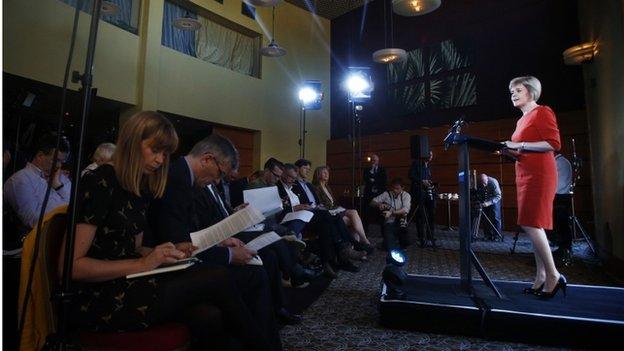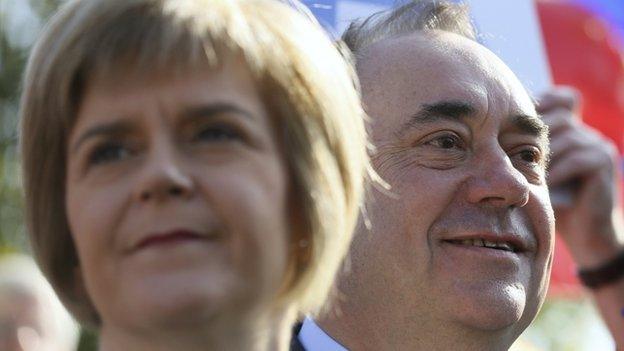Scottish referendum: Nicola Sturgeon to run for SNP leader job
- Published
"His are big boots to fill ... I will wear my own shoes and they will have higher heels" - Nicola Sturgeon
Nicola Sturgeon has launched her bid to replace Alex Salmond as SNP leader and first minister of Scotland.
Speaking in Glasgow, Ms Sturgeon said she was "more convinced than ever" that Scotland would one day be independent.
But she also expressed her willingness to work with the Smith commission to boost Holyrood's powers.
Mr Salmond announced he was stepping down in the wake of Scots rejecting independence in last Thursday's referendum.
Ms Sturgeon, who is currently the SNP's deputy leader and Scotland's deputy first minister, said the country could only become independent if the electorate backed the move in a referendum.
But she did not rule out the possibility of the SNP including a commitment to hold a second referendum in a future election manifesto.
Confirming her leadership bid, she said: "To be the first minister of my country, especially at this exciting and optimistic time, would be both a great honour - without doubt, the greatest honour - and an immense responsibility.
"I am putting myself forward for two simple reasons: I want to serve my party and my country. And I believe I am the best person for the job.
"I also hope that my candidacy, should it succeed, will send a strong message to every girl and young woman in Scotland - no matter your background or what you want to achieve in life, in Scotland in 2014 there is no glass ceiling on ambition."

Analysis: Brian Taylor, BBC Scotland political editor
Nicola Sturgeon will face many challenges ahead - on the realistic presumption that she is elected SNP leader and thus first minister.
Not, incidentally, that she was making any such presumption today: her linguistic tense was uniformly conditional.
To add to those structural challenges, a transient one. Ms Sturgeon's voice was discernibly struggling after the rigours of the referendum.
Facing a comparable challenge, I tendered a comradely throat pastille. (For the avoidance of any doubt, I would do likewise for any other politician from any other party. Laryngitis knows no boundaries.)
But, if her voice was slightly (and only slightly) below par, her meaning on a range of issues was clear and sharp: in her speech, in responding to media questions and in subsequent interviews.

Paying tribute to Mr Salmond, whom she regards as her mentor, Ms Sturgeon said: "Alex Salmond transformed the SNP and as first minister he has made Scotland a better place. He also helped to make me the person and politician I am today."
But she also stressed her intention to chart her own course as leader, and said that a "different approach" was required after the referendum.
She said: "His are big boots to fill, but if given the opportunity to lead, I will wear my own shoes - and they will certainly have higher heels. I will be my own person and set my own course.


"We would not have come so far as a nation without Alex's vision, tenacity and statesmanship.
"But the challenges and opportunities of tomorrow require a different approach. They will demand the ability, not just to argue a case with determination and conviction, but also to reach out, to work with others and seek common cause on the issues that unite us."
She pledged to hold the UK parties to account on their "vow" of delivering more powers to Scotland's devolved parliament, and pledged that the SNP would be an active participant in the process rather than "sitting on the sidelines".
But she said the "days of backroom deals" were over, and the Scottish Parliament and Scottish people must be listened to and respected, rather than a deal being left to the "Westminster establishment" to sign off.

Background: SNP leadership ballot
Any party member wishing to stand against MS Sturgeon has three weeks - until 16:00 on 15 October - to declare. A valid nomination needs to be endorsed by 100 party members from at least 20 local branches.
The contest will be decided by a ballot of all party members, with papers to be sent out on 22 October. They will need to be returned by 12 November.
The result will be announced at the SNP conference in Perth at midday on Thursday 13 November.
The deputy leadership race, the probable outcome of which is much less clear, will run to the same timetable. Ms Sturgeon has not endorsed any candidate as a running mate.
The 26,000 new members the SNP has recruited since the independence referendum will be entitled to vote, as long as they signed up before Wednesday.
Ms Sturgeon's appointment as Scotland's first minister would need to be approved by a vote of parliament, but would be ensured by the SNP's parliamentary majority.

Ms Sturgeon, who would become Scotland's first female first minister and her party's first female leader, called for the Scottish Parliament to be given control over its own elections, which would allow 16 and 17-year-olds to take part in future ballots.
And she said any new devolution settlement must "deliver new powers for Scotland capable of making a real difference to people's lives".
"We must seize the opportunity to design a comprehensive and coherent package that will allow us to create jobs, ensure proper fiscal accountability, protect our public services, deliver fair social security and tackle the inequality that scars our nation," she added.
Ms Sturgeon said: "Through Gordon Brown - speaking we were told with the authority of each of the parties in the Better Together campaign - the promise was clear and unmistakable. This package would be 'home rule' and 'something near to federalism'.
"Well let me say this to Westminster on behalf of Scotland - it had better be."
Nicola Sturgeon's SNP candidacy speech in full
But she conceded that the "Yes" campaign had lost the referendum, and that independence could only be achieved at the ballot box.
She said: "I believe as strongly today as I did last week that independence is the best future for Scotland. And I am more convinced than ever that we will become an independent country. But that will happen only when the people of Scotland choose that course in the polling booth.
"I accept that last week the majority did not choose that future at this time. 1.6 million people is a remarkable number - but it wasn't enough.
"So my task will be to lead Scotland into an exciting new chapter in our national story. To unite our nation around a common purpose so that we can write that story together - and do so in a way that lives up to the hopes, aspirations and expectations of a country that is, on both sides, engaged, inspired and empowered by the referendum experience."
On the possibility of another referendum, Ms Sturgeon said "opinion and demand" would dictate future decisions, but added: "If there is a commitment to a referendum in a manifesto of the SNP at an election and we win that election then that is a mandate for a referendum."
Almost every member of the Scottish cabinet has publicly backed Ms Sturgeon, who will campaign under the banner: "Moving Scotland forward".
Meanwhile, the SNP now claims to be the third largest party in the UK, after the party said its membership stood at more than 50,000, which it said overtook the figure for the Liberal Democrats UK-wide, reported to be 43,451.